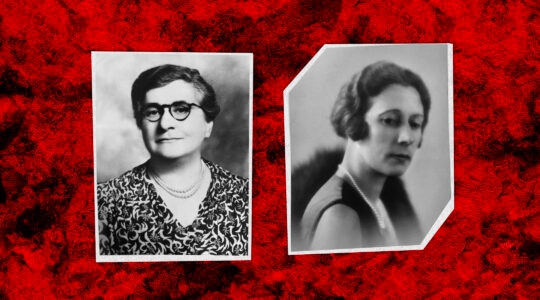The rise of sexual liberty as a fundamental right, together with the collective realization that many people do not fit neatly into the category of male or female, is creating a bathroom controversy. This controversy focuses on people who are not part of the traditional male-female binary that has been a part of the American culture for centuries.
Americans have considered the myriad of questions — philosophical, religious, legal, and practical — and homed in on a single mundane issue: which bathroom transgender individuals should use. The secular legal system is in the process of handling the public policy arguments on both sides of this novel issue.
Nor is this a uniquely secular problem; halacha [Jewish law] encounters these matters as well. Consider the case of an individual who suffers from Klinefelter syndrome: a male physique with close to female genitalia. This intersex individual faces countless questions of Jewish law: Are they expected to daven with a minyan? Should they put on tefillin and wear tzitzis? On which side of the mechitza is the proper seat? And, of course, what bathroom should they use?
One might think the transgender issue novel in Jewish law, but that would be a mistake. While the popular conception of Orthodox Judaism includes pronounced traditional gender roles, in truth, halacha makes reference to variations on biologically intersex and transgender as far back as the Mishnah. These variations include androgynos (exhibiting both male and female characteristics), tumtum (lacking the appearance of differentiated external genitalia), aylonit (female genitalia with male secondary traits) and yet others, including saris (which in turn includes transgender).
In short, Jewish law places male-to-female transgender under the same umbrella category as a type of intersex. And, outwardly, the presentation is similar. Which begs the question: Why are we Americans suddenly so concerned about transgender bathroom usage when there was never an uproar about intersex bathroom usage?
The proper solution to the transgender bathroom issue obviates the need for any in-depth assessment of gender status and identity, which is both hard to do and very individualized. While the particulars of one’s anatomy can be important in Jewish law, for example with respect to marriage, they are of no concern when considering bathroom usage. The solution is much simpler.
As Rabbi Moshe Feinstein notes in his responsa addressing bathroom privacy (Iggrot Moshe YD 2:47), and which the halachic literature has noted many times in other places, modesty in times of nudity is a value even when one is among others of the same gender. The Jewish ethical tradition was never truly comfortable with single-sex communal showers or communal bathroom facilities. We are a private people and these are private functions; nothing is gained by performing them in shared space.
This halachic emphasis on bathroom modesty is even more relevant in our hyper-sexualized times, and is complicated by the presence of individuals who do not clearly and completely fit in either the male or female category.
The solution is to change our bathrooms rather than our ethics. Regardless of the side of the moral argument on which one falls, a better bathroom solves the problems. Unisex mini-bathrooms would address not only the issue of transgender bathroom usage, but also of privacy and modesty concerns generally.
Houses have unisex bathrooms. The airplane on which the first draft of this paper was written has unisex bathrooms, and so do many other places. Unisex mini-bathrooms are more consistent with our Jewish values than the familiar, gendered, semi-private, communal model. Private unisex bathrooms are more modest in every way than communal facilities, which at best are only semi-private and which many find uncomfortable and immodest.
In this model, the bathroom area of any public place would contain many small, self-contained, fully enclosed rooms, like those in a private residence or on an airplane (hopefully larger than the latter), each with a toilet. Every person would have a private unisex mini-bathroom. There would be no collective men’s or women’s room.
Some businesses have already instituted unisex mini-bathrooms to address these issues. For example, the Optimism Brewing Company in Seattle, has “one big restroom without a door, one giant fountain sink, and two rows of private stalls with fixtures divided into two categories: toilets and urinals.” This design creates a safe and private space for each person to use the bathroom. It also allows any parent to access the changing table, eliminates the problem of a long line for the women’s bathroom at the same time that stalls stand empty in the men’s, and even seems to encourage hand-washing among patrons due to the relatively public nature of the hand-washing area. It is deeply consistent with what the Jewish tradition recommends for a modest society.
Besides gender issues, bathroom layouts have long marginalized the privacy needs of children and adults who need assistance. This is of vital concern within Jewish law, as the needs of the weak and handicapped are a religious imperative. Unisex mini-bathrooms would protect the dignity of these individuals as well.
Fighting over whether women who identify as men should be allowed in the men’s bathroom (or vice versa), or over classification of transitioning individuals for bathroom purposes, misses an opportunity to build a better society for all. It is irrelevant for the purpose of bathroom access whether transgender is biological, genetic, imagined, or even insincere, or what a person’s supposedly “true” gender is as a matter of law. Jewish law mandates a solution that protects the dignity and privacy of every person wishing to make use of a bathroom.
Religiously, we should support solutions that maximize modesty and increase the societal sense that bathroom matters are private.
Rabbi Michael J. Broyde is a law professor at Emory University School of Law, a Fellow in the Center for the Study of Law and Religion and writes regularly on matters of Jewish law. Amy D. Katz is an attorney who lives in Atlanta.
The New York Jewish Week brings you the stories behind the headlines, keeping you connected to Jewish life in New York. Help sustain the reporting you trust by donating today.




